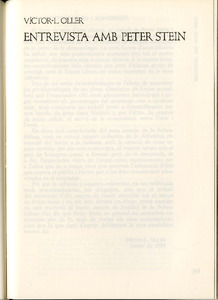Mostra el registre d'unitat simple
Entrevista amb Peter Stein
| dc.contributor.author | Oller, Victor L. | |
| dc.date.accessioned | 2022-12-30T15:53:28Z | |
| dc.date.available | 2022-12-30T15:53:28Z | |
| dc.date.issued | 1985 | |
| dc.identifier.issn | 2385-362X | |
| dc.identifier.issn | 0212-3819 | |
| dc.identifier.uri | http://hdl.handle.net/20.500.11904/1355 | |
| dc.description.abstract | <p>Peter Stein has been at the forefront of a team of actors, playwrights and theatrical designers for more than a decade, and he has converted the Schaubühne into one of the most important theatrical initiatives in Europe. He has rejected the Italian-style stage and has converted the auditorium into one more element of the scenery. The Schaμbuhne was born after a crisis in the German theatre; if at the beginning Stein gave his work a political meaning, now his premises, like those of any artist, have changed: today it would be unthinkable for him to lend whole-hearted support to the Vietnam cause, such as he used to, for the simple reason that the policies pursued by the Vietnamese meet with his energetic rejection. The Schaubühne has gone back to the repertory of old works which make up theatre history, because they reflect other eras, when things were different, calmer, and a more concentrated, truthful theatrical treatment is possible. In German cultural history the theatre has travelled its own particular path and has developed to an exceptional extent, above all as far as concerns the diversity of new plays and its overwhelming presence in cultural life. In the Schaubühne the actors work in a small auditorium, and only rarely in a big one, when there is a big demand and the run of shows cannot be extended.</p> | |
| dc.relation.ispartof | Estudis escènics: quaderns de l'Institut del Teatre. 1985, Núm. 26 | |
| dc.title | Entrevista amb Peter Stein | |
| dc.type | Article | |
| dc.date.updated | 2022-12-30T15:53:29Z | |
| dc.rights.access | Open Access |
Fitxers d'aquest document
Aquest element apareix a les col·leccions següents
-
1985: Núm.: 26 [5]


